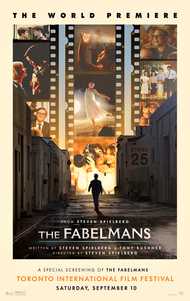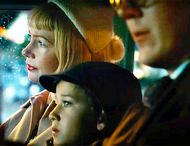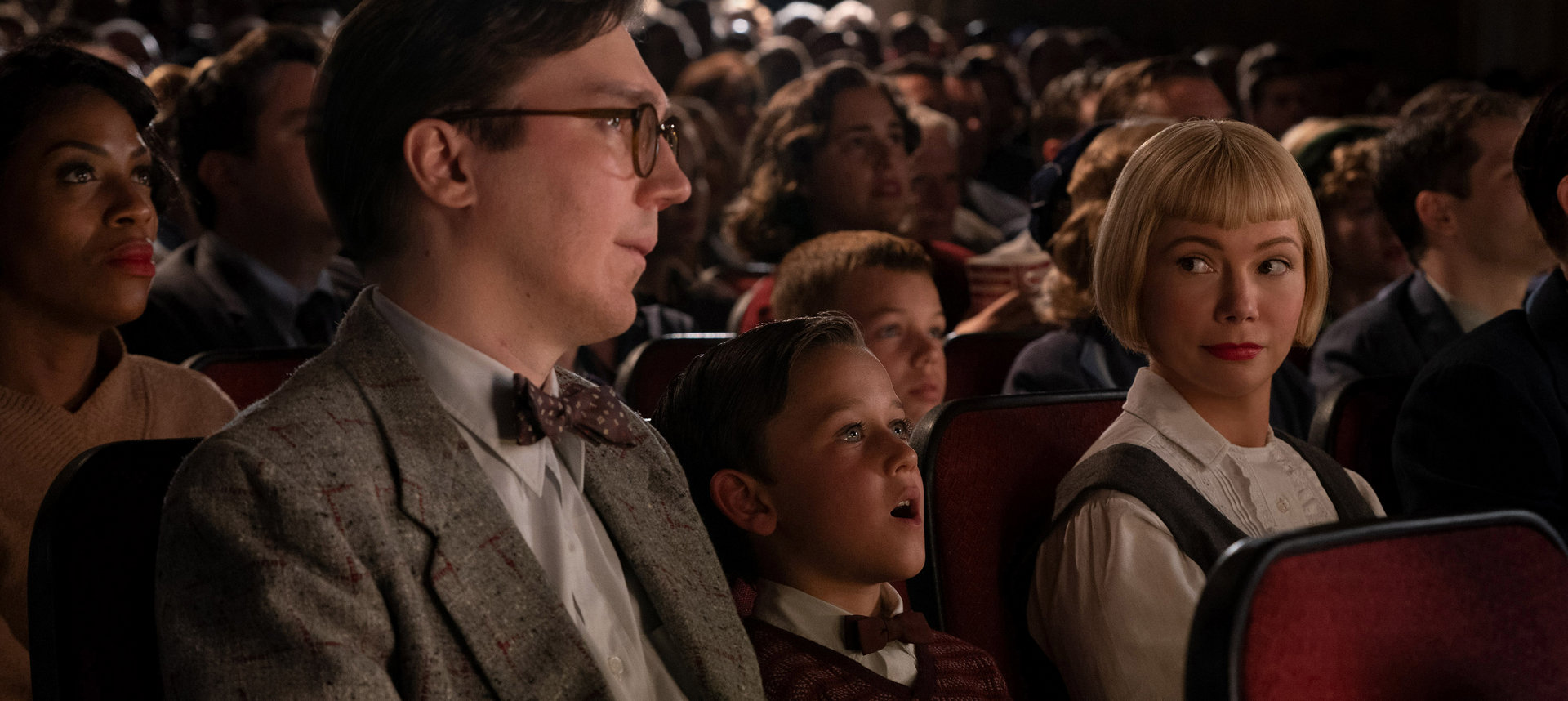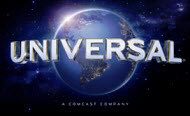The Fabelmans
 for some strong language, thematic elements, brief violence and drug use.
for some strong language, thematic elements, brief violence and drug use.
Reviewed by: Jim O'Neill
CONTRIBUTOR
| Moral Rating: | Offensive |
| Moviemaking Quality: |
|
| Primary Audience: | Adults Young-Adults |
| Genre: | Coming-of-age Drama |
| Length: | 2 hr. 31 min. |
| Year of Release: | 2022 |
| USA Release: |
November 11, 2022 (limited) November 23, 2022 (wide release) DVD: February 14, 2023 |




Semi autobiography of Steven Spielberg’s childhood (age 7-18)
Life in Arizon after World War II 1950s and 60s
Teenage boy coming of age and wanting to become a filmmaker
Boy Scout troop
Family relationships
Jewish family
Anti-semitism
Financial disadvantage
| Featuring |
Gabriel LaBelle … Sammy Fabelman, the eldest 16-year-old son of the family, who aspires to become a filmmaker Michelle Williams … Mitzi Fabelman, Sammy’s mother and a skilled pianist Paul Dano … Burt Fabelman, Sammy’s father and a computer engineer Seth Rogen … Bennie Loewy Jeannie Berlin … Hadassah Fabelman Julia Butters … Reggie Fabelman Robin Bartlett … Tina Schildkraut Keeley Karsten … Natalie Fabelman Judd Hirsch … Uncle Boris See all » |
| Director |
Steven Spielberg |
| Producer |
Amblin Entertainment Amblin Partners See all » |
| Distributor |
As a filmmaker, Steven Spielberg had an auspicious start. In “Sugarland Express,” “Jaws,” and “Close Encounters of the Third Kind” he used the camera in ways that, beforehand, had not been imagined, let alone explored. Those early cinematic fireworks brought new life to an art form that, in the 1970s, needed to be seriously revived or be placed on a suicide watch.
Spielberg not only brought moviegoers to the theaters en masse; he influenced a generation of movie makers to a degree not seen since the days of Orson Welles, Federico Fellini and Jean-Luc Godard. And unlike devotees of those aggrandized auteurs (I was one, and I still am), you could go to a Spielberg movie and not feel like you were doing homework. It felt more like playing hooky, but in the process, still be studying and still be learning.
The effect was exhilarating.
So a personal reflection of how such a creative mind works and how this inner spark ignites would be something to see. And to marvel at. When I went to see his new movie, “The Fabelmans,” while I was not expecting the cinematic depth of Ingmar Bergman’s delicate but haunting family reminiscence “Fanny and Alexander” or Fellini’s elegant but heartbreaking admonishment “Amarcord,” I nonetheless believed Spielberg had it in him to put forth a reflective drama with warmth and grit along with some satisfying helpings of his trademark razzle-dazzle.
The good news is that, with “The Fabelmans,” Spielberg puts together a personal and somewhat pared down chronicle of family life, having come down from the high-horse perspective that made “The Post” “The BFG,” and “West Side Story” so insufferable. The wrecking ball that opened “West Side Story, something Welles or Fellini would have turned into a self-effacing joke, was used by Spielberg as a dead-serious metaphor of our times. Unfortunately for him, it proved an omen of not just what he was about to do to a classic American musical, but to his own already declining career. With his new film, he almost turns things around. Despite his affinity for preachiness and his eagerness to bend a knee to Hollywood cultural norms the way his young hero, Sammy, bows to the bullies in his high school, he proves that he can still intermittently charm, enchant and astound.
The rest of the news is that although “The Fabelmans” is indeed a departure for the director, that departure is more one of scope than scale. Spielberg still strives to make almost everything, even high school film projects, bigger than life. The bravado that borders on swagger is everywhere, even in minor scenes with supporting characters, especially those played by the otherwise fine actors Judd Hirsch and Jeannie Berlin. Hirsch is particularly noxious, his Uncle Boris dropping like a grenade into the Fabelman family routine. He’s a copy of the Uncle Louie character in Neil Simon’s “Lost in Yonkers,” whose presence seems to be an attempt to wake things up or to bring a simmer to a boil when a low dial would work just fine. “Family and art; they’ll cut you in half,” he tells his nephew. Uncle Boris’ own art consists of working as a circus performer, often putting his head inside the mouth of a lion. Perhaps that accounts for Hirsch’s portrayal coming off as a short but ear-piercing roar.
Despite the film’s intimate suburban settings and tight-knit but unraveling family bonds, the softness and subtlety that defines everyday life, as well as great art, is missing. Spielberg endows those things with some temporary luster, a glow that sometimes burns bright, but too often goes quickly to fade, like bits of film reel that flap on the end of a projector. He infuses considerable anxiety but only occasional tenderness into the setting. There is a barely concealed contempt for 1950s/1960s America—its social, political, and even moral attitudes—that the Fabelman family finds itself in, although it does hint that societal constraints can provide stability and even inspiration to those with an idea and an imagination.
A story within a story works best if the two stories come together as one, but Spielberg puts a camera within a camera in a way that feels intrusive, disruptive and even creepy. Sammy Fabelman, Spielberg’s fictionalized version of his teenage self, played with just the right mix of outgoing gusto, quiet reflection, and barely contained anxiety by Gabriel LaBelle, learns that a camera and some editing tools can do more that weave a tale or rattle a nerve. It can expose a truth.
Spielberg alludes to that power during a sequence in which Sammy films and splices his way to a conclusion about his parents’ marriage. His celluloid truth when projected on a screen may look plain and simple, but it never crosses his precocious intellect that he may wind up with something that is neither plain nor simple.
Cinema and Christianity, unlike the members of the extended Fabelman family, have always been rather distant relatives. Both see truth differently. Christianity defines truth as a Person. A film can allude to that Person, or direct us to Him. But it cannot create Him.
“All things were made through Him, and without Him was not anything made that was made.” —John 1:3
“And oftentimes to win us to our harm, the instruments of darkness tell us truths.” —Shakespeare, “Macbeth,” Act I, scene 3
“Darling, you don’t know page one.” —“Kiss of the Spider Woman,” 1985 film by Hector Babanco
Sammy’s first movie experience is a family outing to see “The Greatest Show on Earth,” one of the last films made by Cecil B. DeMille, a maker of grand Hollywood epics which, impressive as they are, today feel like overweighted Towers of Babel. Nonetheless, it was a thrill to watch that film’s climactic train crash again and charming to watch Sammy’s attempt to recreate that scene in his own living room, using his own toy trains and human figurines.
Sammy’s parents indulge his activities although they worry that such pastimes, or in Sammy’s case, obsessions, may not prepare him for an uncertain future in a time when being practical was seen as safer than being creative. “If you spent half as much time with algebra…” his father admonishes him.
Sammy’s father, Burt, moves his wife and children from one state to another in order to take whatever job provides them the best support. His mother, Mitzi, cares for the home, but has lapses when faced with traumatic events that trigger attacks of anxiety, or worse. She retreats into herself when the world closes in, and she lets loose by dancing in a sheer, very sheer, nightgown in front of her children and by bringing a monkey into the home as a pet. She is an adept classical pianist, even an inspired one, although she allows her unclipped fingernails to make her playing sound like she is tapping on a typewriter.
The modern cliché of the 1950s stay at home mom who is unappreciated and unfulfilled is front and center although Michelle Williams’ performance as Mitzi has the underlying pathos and the necessary shadings to bring the character out of the muck of the paint-by-numbers script by Tony Kushner. Unfortunately, the makeup department do Williams little service by giving her a hairstyle that’s a blond copy of Louise Brooks’ helmet bob, or worse, a replica of Johnny Depp’s Willy Wonka do. Wouldn’t a woman as interested in art and movies as Mitzi seemed to be, change her look over the years or look toward stars of her time—Natalie Wood, Sandra Dee, Brigitte Bardot—for inspiration?
Paul Dano is one of the few actors who can make drabness interesting, if not intriguing. He has a “here I am, step on me” quality that I would love to see him turn around and release on the world the way Ernest Borgnine did in “Marty” or Woody Allen did in “Annie Hall.” Dano got close to fighting back in the underrated 2010 film “The Extra Man,” but most of the time he seems unnaturally stiff. And he’s no different here. The desperation and the passion the other actors, even the over-actors, convey eludes Dano. His Burt, though fiercely intelligent, is ultimately ineffectual and lost. He’s a sad Ashley Wilkes, minus the pedigree and the sword. He can’t even keep the girl.
Burt’s good friend and co-worker, Bennie, is played by Seth Rogen, who leaves behind his customary smug oafishness and turns in his first fully realized performance, an almost tender one. Mitzi turns to Bennie as her own marriage comes apart, that disintegration being well integrated but not well thought out by the boy who is discovering how 24 frames per second and a splicing machine can tell what he concludes is a complete story. He may have page one, but where’s the rest of the story? Is there a difference between the celluloid recreations of his parents and the real lives of those parents?
Spielberg’s hero children tend to be more vivid than their adult counterparts. The director imbues them with worth and wonder, able to find joy in their small worlds in the face of antisemitism, bullying and divorce in “The Fabelmans” or in the throws of larger dramas in “War Horse,” “Shindler’s List,” or “E.T.” One of his greatest attributes is his ability to revive that child-like sense in all of us, a sense that rejoices in a child’s achievement, that same awe we feel when we read a passage about a young boy speaking to leaders in a temple (“all that heard Him were astonished at His Wisdom and His answers”), or when that same child becomes a man and so tenderly asks his fisherman friends: “Children, have you caught anything?”
The characterizations of high-school anti-Semitisim may be boilerplate and feel like something out of a 1980s sitcom, but they are harrowing and most likely true to life for the time. I still can’t help but ask why is it always the guys with the letter sweaters who are the most vicious anti-Semites?
On the other hand, what seems wildly not just amateurish but ludicrous are the depictions of Christianity as more deserving of derision than respect. I may have gotten a good laugh at a teenage girl’s bedroom wall being plastered with images of Jesus alongside those of Fabian and Bobby Rydel, but the association of religious fervor, even of the nascent type, with sexual arousal being played for jokes is a humorless retread, one that ties an anchor around Spielberg’s already sinking movie. The awkwardness of those scenes is no doubt due to Kushner’s writing; for all the disdain the screenwriter has for Christianity, he lacks the depth and the guts to face it head on the way Paul Shrader with his 2017 film, “First Reformed” or Luis Bunuel with his 1961 film, “Viridiana” did. Those filmmakers understood that there were contradictions not just in what they were directing their words and their lenses at, but in themselves as well.
Spielberg’s “The Fabelmans” is not a folly. It is not daring enough to rise to a level where it risks falling on its face. The director understands that he is no longer a teenager with a homemade camera; he is a Hollywood icon. As a late teen/young man, his fictional stand-in has the opportunity to meet one of his own idols, director John Ford. The scene reaches for archetype status but comes across as disjointed and clumsy although David Lynch almost saves the moment with a great comic turn as Ford.
Unlike the fiercely individualistic Ford, Spielberg is now a predictable Hollywood staple. He may own the town, but in turn, the town owns him. Today’s Hollywood is a place that has its own set of truths and its own religion, complete with commandments and heresies and punishments. Spielberg adheres to that faith, and as one of its practitioners, can he still be the cinematic artist he once was, and still tap into the magic that makes us look deep into ourselves and not to the fashions of the day?
“The Fabelmans” answers that question: probably not.
- Vulgar/Crude language: Heavy— F-word and various other obscenities
- Profane language: Heavy— • J*sus (3), G*d d*mn (12)
- Wokeism: Moderate
- Violence: Moderate
- Sex: Moderate
- Nudity: Minor
- Drugs/Alcohol: Minor
- Occult: None
This film suggests that your believe in yourself and follow your heart
“Just believe in yourself… Be true to yourself” is a common worldly view and message. Is that what God urges us to do? What does His Word reveal?…
YOU ARE BORN SPIRITUALLY DEAD, and remain so if you are not born-again.
Ever since Adam’s first sin, all humans are born spiritually DEAD, in rebellion against God and a continual slave to sin. If you have not been reborn into the Kingdom of God, you are in the kingdom of Satan, the Great Deceiver.
- See: What is spiritual regeneration (being born-again)?
If you, do NOT fear God, you can NEVER become truly wise.
THE FEAR OF THE LORD— What is it? Why is it very important? Answer
One of the world’s biggest and most common sins is SELF-CENTERED EGOTISM—sinful pride and selfishness.
Drop your pridefulness— HUMILITY before God is vitally important. Humility opens your eyes to truth and wisdom.
Don’t think of yourself more highly than you ought (Romans 12:3).
Conceit comes before a fall into condemnation (1 Timothy 3:6).
What does God love, and what does He hate? He loves a humble repentant heart. He hates a prideful sinful one.
If we suffocate pride, we will starve every other sin of its oxygen.
CONFIDENCE in what? Yourself? For a Christian, self-confidence is in who we are in Christ, not who we are in ourselves. He is our identity, and God’s Holy Spirit dwells in us. Believe in what GOD can do THROUGH YOU.
Devote your life to serving God faithfully, pursuing holiness, righteousness, being one who truly loves (an action, not an emotion)—doing good works.
Allow the Holy Spirit of God to ALIGN YOU WITH GOD’S VIEW—your heart, thoughts and actions.
What is sanctification?
For a follower of Christ, what is LOVE—a feeling, an emotion, or an action? Answer
-
“Trust in the Lord with all your heart, and lean not on your own understanding. In all your ways acknowledge Him, and He shall direct your paths.” —Proverbs 3:5-6
I must decrease, but He must increase. —John 3:30
Don’t be a hypocrite—one way on the outside, and far different on the inside—in reality, believing in yourself, not God.
 Every time you buy a movie ticket or buy or rent a video you are in effect casting a vote telling Hollywood, “I’ll pay for that. That’s what I want.” Read our article
Every time you buy a movie ticket or buy or rent a video you are in effect casting a vote telling Hollywood, “I’ll pay for that. That’s what I want.” Read our article
Learn about DISCERNMENT—wisdom in making personal entertainment decisions
See list of Relevant Issues—questions-and-answers.


This was honestly the only movie I thought would be the most neutral, but again I was wrong to give any movie made in these times a chance. Lesson learned. I’ll stick to documentaries and Hallmark movies for now on.
Moral rating: Extremely Offensive / Moviemaking quality: 3
Moral rating: Extremely Offensive / Moviemaking quality: 3
Moral rating: Very Offensive / Moviemaking quality: ½
This is undoubtedly a story about him. A story about his family, his childhood, and his burgeoning years. And I imagine it was tempting to portray it through rose-tinted glasses. Make no mistake, he does so at times, and it’s to both the benefit and detriment of the overall experience.
The tint of nostalgia helps his portrayal of childhood filmmaking excursions, and the whimsy of finding your purpose. But it absolutely poisons the portrayal of his mother’s affair, and the eventual downfall of his family structure. At this stage in his life, I’m sure Spielberg has mended the emotional wounds of that time in his life, but what has come from that is far too much acceptance of the sins committed by those he values.
Instead of condemning the selfishness of his mother’s actions, (which he rightfully does in a scene before his younger sister “morally strongholds” him in a purportedly truthful moment) he succumbs to the idea that his mother had the right to abandon him and his father because she wanted to have intercourse with another man. “Follow your heart,” she tells her son a day after announcing her divorce to the family, a message that Hollywood continually pumps out as a pretty way of saying, “Act on emotions whenever it suits you.”
Mrs. Fabelmans choice to leave her responsibilities is mourned, as expected, but it isn’t chastised. Her choice leaves a broken family, an unhappy father, and a hurt son, which is evident by the son’s need to make an entire movie about it in the latter quarter of his life.
But hey, as long as she’s happy right?
My goodness where have we ended up at in this culture?
In an age where the world tells us to find our own truth, even if it means abandoning reality and responsibility, “The Fabelmans” could’ve been a pertinent reminder of how poisonous selfishness is, all while showcasing a tale of a boy and his camera. But instead, it’s a tale of a boy and his camera, told by the boy, that condones selfish home-wrecking behavior merely because he loves the people that engaged in it. This is not a mature take. This is a sheepish take. A take unwilling to take a stand.
And the worst part is that such cowardice comes from one of the greatest filmmakers of all time.
Moral rating: Very Offensive / Moviemaking quality: 5
PLEASE share your observations and insights to be posted here.


Spielberg is also one of my favorite directors, and this semi-autobiographical story is one of his best movies. In fact, “Schindler’s Lis”t is my favorite movie of his, but “The Fabelmans” takes 2nd place. That’s my “critic” review in one paragraph. Now from a Christian perspective:See all »
My Ratings: Moral rating: Offensive / Moviemaking quality: 5